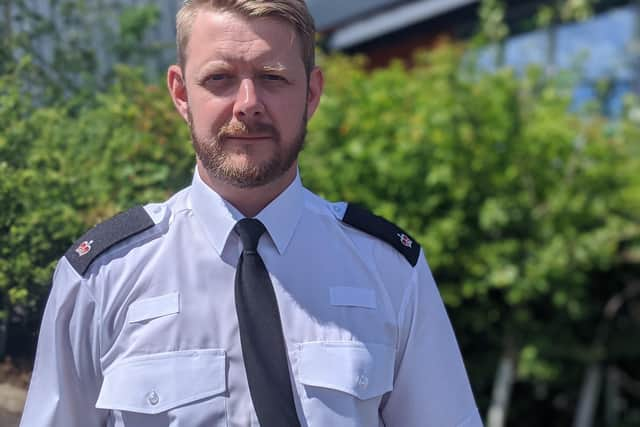'We must break this terrible cycle': Top police officer on Sheffield's knife crime problem
and live on Freeview channel 276
Those who carry knives, or are at risk of carrying knives, are the target of a nationwide police initiative this week, and South Yorkshire Police is devoting its efforts to educating people and enforcing the law around knife crime in Sheffield.
Operation Sceptre is utilising resources from across South Yorkshire Police and its neighbourhood teams to deal with knife crime at its root cause.


Advertisement
Hide AdAdvertisement
Hide AdIt is doing this through educational sessions in schools on the consequences of carrying a blade and online videos featuring people impacted by knife crime.
And it also sees SYP carrying out searches and warrants in public spaces and transport hubs, visiting habitual knife carriers, and placing amnesty bins for knives throughout the city.
Superintendant Ian Proffitt, who is leading South Yorkshire Police on Operation Sceptre, said that both the education and the enforcement sides of the operation were vital to reducing knife crime in Sheffield.
“The enforcement of the law around knife crime is obviously a really important bit of it,” he said. “But the long term plan is to try and educate people to try and deter them from carrying the knives in the first place.
Advertisement
Hide AdAdvertisement
Hide Ad“We want to educate people about what criminalises them for possessing weapons and encourage them to hand them into amnesty bins.
“We want people to stop and think that some of the things they own could be illegal and dangerous.
“And we want to encourage people to think about the ripple effect of knife crime. The victim’s life is ruined, and they have loved ones. Then there’s the loved ones of the person who did the crime and could end up in prison with their life ruined, too.
“There’s the communities where the knife crime happens. And we’ve even done a video with a doctor about the trauma of having to treat somebody who has been stabbed. Knife crime affects a lot of people.”
Advertisement
Hide AdAdvertisement
Hide AdRecent data released by NHS Digital showed that 1,000 people have ended up in hospital after stabbings in South Yorkshire over the last decade.
Between April 2012 and March this year, there were around 1,210 admissions of patients from the South Yorkshire policing area following an assault with a sharp object. Of those, around 36 per cent involved people aged under 25.
And anti-knife campaigner Anthony Olaseinde, who runs charity Always an Alternative, has previously warned about the ‘normalisation’ of carrying blades in Sheffield.
The Star asked the superintendant whether knife crime was particularly bad in Sheffield.
Advertisement
Hide AdAdvertisement
Hide AdSupt Proffitt explained: “Knife crime in South Yorkshire and specifically in Sheffield is not dissimilar to other areas in the country that have large populations. Any city in the UK unfortunately has a certain amount of challenge around violence and knife crime.”
And he offered insight into how knife crime can become a self-perpetuating issue if it is not dealt with through educating young people.
“I think sometimes the fear of knife crime itself caused more knife crime,” he said.
“Young people have the misconception that they need to protect themselves from something that is not as much of a threat as they might think.
Advertisement
Hide AdAdvertisement
Hide Ad“This is why part of the campaign is to make people stop and think. If you carry a knife you are actually more likely to become injured than if you do not carry one.
“It’s a terrible cycle where young people who think they need a knife to protect themselves get injured, or injure somebody with a knife, which prompts more fear of knife crime.
“The main thing is to break this cycle.”
MORE ON KNIFE CRIME: More than two in five serious offenders in South Yorkshire are ‘career criminals’ with at least 15 previous offences
Supt Proffitt added that Operation Sceptre is also aiming to encourage people who know those carrying knives to help get the weapons off Sheffield’s streets.
He explained that recent changes to legislation means that it is now illegal to own certain weapons in private, as well as to carry them in public.
Advertisement
Hide AdAdvertisement
Hide AdThese weapons include flick knives, butterfly knives, zombie knives, telescopic truncheons and samurai swords.
“We want people who know somebody to has any of these in their home to encourage them to hand them in to one of our amnesty bins. We want to stop them falling into the hands of people who might hurt somebody with them,” he said.
“People who are around knife carriers can impact the outcomes of what the knives are used for. They can help reduce the risk of somebody they know being involved in an incident that can ruin many lives.”
Amnesty bins are containers where people can dispose of their weapons without facing prosecution for owning them.
Advertisement
Hide AdAdvertisement
Hide AdIn Sheffield, the bins can be found at Mossway Police Station, Ecclesfield Police Station, Snig Hill Police Station and on Fretson Green, Manor.
Operation Sceptre’s week-long focus on knife crime ‘draws attention’ to a much longer-running campaign against the issue in Sheffield, Supt Proffitt said.
Over ‘several years’ education programmes have been taking place in Sheffield schools. SYP estimate that more than 55,000 children have been involved in discussions on knife crime in the county.
“The success of these programmes is measured by the long term impact they have on people,” Supt. Proffitt added. “It is about raising awareness, and if somebody does think twice about carrying a knife or realise that something that they own is illegal then that is success.
Advertisement
Hide AdAdvertisement
Hide Ad“Operation Sceptre is about highlighting these issues with a week of action and consistent messaging, and is part of a long term campaign to convince fewer people in South Yorkshire to arm themselves with weapons.”

